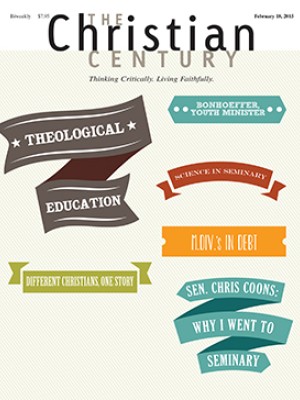Duke reverses stance on Muslim prayer
The Muslim call to prayer was broadcast from a small black loudspeaker perched on the steps of the Duke Chapel on Friday, January 16, as hundreds of students, mostly non-Muslim, gathered in support of the right of all students to pray publicly.
The gathering, replete with signs reading “Let us worship together” and “Please pray here,” was quiet and peaceful and emerged spontaneously after Duke University officials the day before had abruptly reversed their decision to broadcast the Muslim adhan, or call to prayer, from the 210-foot bell tower atop the school’s iconic chapel.
The plan had been to broadcast the Muslim call to prayer for about three minutes each Friday.
Instead, the call to prayer was issued from a portable public address system at the foot of the chapel, first in English, spoken by a woman, then in Arabic, recited in the familiar chant.
Speaking to the media prior to the 1 p.m. call to prayer, Michael Schoenfeld, Duke’s vice president of public affairs and government relations, offered little insight into the cancellation besides saying there were “security concerns.”
“The chapel is a very powerful and potent symbol of the university,” Schoenfeld said. “When things happen involving the chapel, it means there has to be a very thoughtful and deliberative process for looking at that. That didn’t happen in this case.”
Read our latest issue or browse back issues.
While Duke officials denied it, some suspected that behind the cancellation was the loud and forceful criticism voiced by Franklin Graham of Boone, North Carolina, who called on Duke alumni to withhold donations until the use of the chapel tower for Muslim prayer was suspended. Graham, who leads the Billy Graham Evangelistic Association, founded by his father, called the change “the right decision.”
Duke was founded by Methodists, and its neo-Gothic chapel at the center of campus bills itself as a “Christian church of uniquely interdenominational character and purpose.” But, as the dean of the chapel explained to reporters, the chapel also serves as a “moderator” and “convener” for other faith groups on campus, including Muslims.
“Our aim is to live into a generous hospitality toward different traditions,” said Luke Powery, the dean of the chapel.
[Richard B. Hays, dean of Duke Divinity School, said that he learned of the initial decision to broadcast the call to prayer after it was made public. He said that the intention of the chapel staff was to show “interfaith hospitality,” but he noted that the chapel “was constructed with explicitly Christian iconography, and it has a long history of explicitly Christian worship.”
He commented: “There are serious questions . . . about the wisdom and propriety” of the initial invitation. “Despite some common beliefs and traditions, Christianity and Islam stand in significant theological tension with one another . . . and the two traditions should not be symbolically conflated.”]
Duke has about 700 Muslim students among a student body of more than 14,000. In 2008, it became one of the first U.S. universities to hire a full-time Muslim chaplain. Shortly afterward, it began offering Friday jumu’ah prayers, which now take place in the basement of the chapel. A few years ago it opened the Center for Muslim Life in a converted ranch house on campus.
Imam Adeel Zeb, the current chaplain, acknowledged that the university has done more than many other schools have to make campus life more inviting to Muslim students.
“We’re very proud to be here as Muslims at Duke,” Zeb said.
He also told reporters there are no plans to reintroduce the bell tower call to prayer.
Omid Safi, director of the Duke Islamic Studies Center, wrote in an e-mail that he was deeply disappointed by the reversal.
“What could have been a celebration of Duke’s commitment to our robust and diverse religious community has had to be adjusted due to the bigotry of Franklin Graham . . . and anonymous people leaving threatening and violent messages for members of the Duke community,” he wrote. “I know that there are many inside of the Duke community and beyond who want to see us be better, be a loving and welcoming community in which all of us bring our religious particularity to the public arena.”
First to show their support for the Muslim students on Friday were Duke Divinity School students, who gathered on the lawn in large numbers.
“Christians are called to be people of peace,” said Sarah Martindell, a third-year graduate student, who drew a sign that said “Duke Divinity Supports You.” “This demonstrates our solidarity with our Muslim neighbors.”
Many others joined in, including a smattering of students from other universities. Sarah Zamamiri, a Muslim who recently graduated from the nearby University of North Carolina at Chapel Hill, said nothing would have stopped her from showing her support to her Muslim brothers and sisters.
“I felt really disappointed,” she said of Duke’s decision. “What Duke did was to amplify the whole conversation of diversity and inclusion.” —Religion News Service
This article was edited on February 3, 2014.



